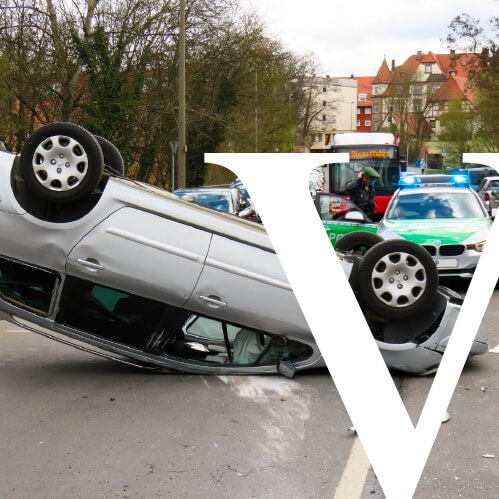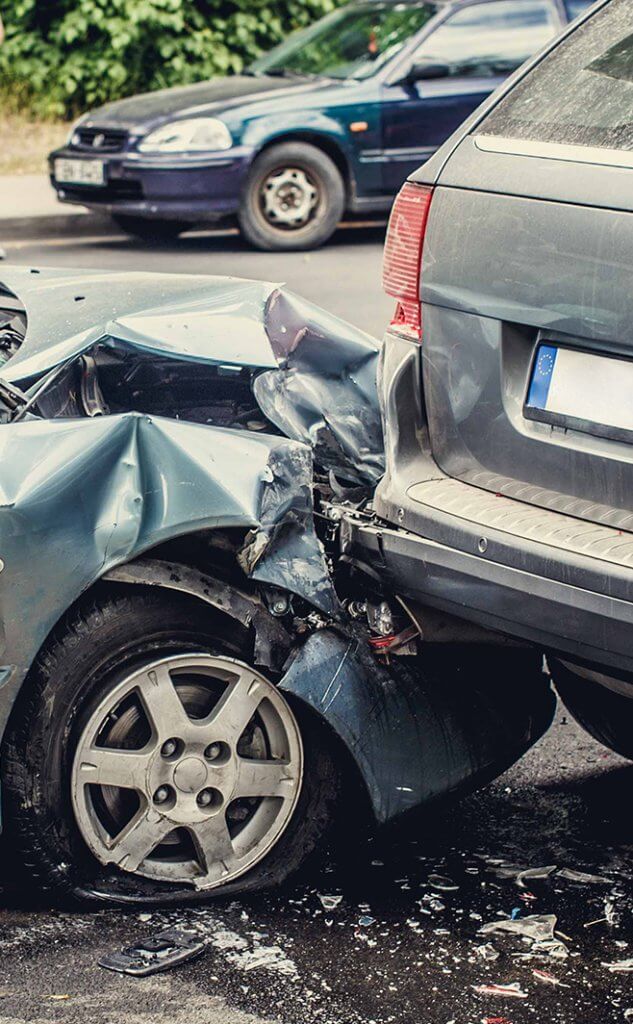
Traffic accidents
For accidents involving motor vehicles on roadways, the applicable legislation is the Act of 5 July 1985 known as the “Badinter Act”.
An employee who is involved in a traffic accident while travelling from home to work, or vice versa, is covered by both the legislation on workplace accidents and the law governing traffic accidents.
Owing to the kinetic force of a motor vehicle, road accidents frequently result in serious accidents involving multiple injuries. While spinal cord injuries can be immediately detected, this is not always the case for traumas to the head.
How does this work?
Who receives compensation?
The Badinter Act provides for favourable treatment of road accident victims. Pedestrians, cyclists, and passengers are, with rare exceptions, granted compensation.
The driver will be entitled to receive full compensation if they are not at fault. If they are partially responsible, their compensation will be reduced in proportion to their fault. The driver, even when at fault, shall be compensated within the limits of their insurance policy, if they subscribed to a driver’s insurance policy.
Indirect victims such as spouses, children, etc. receive compensation in the event of serious injury or death.
Who provides compensation?
The insurance company of the vehicle that caused the accident is obliged to compensate the victims.
If the vehicle responsible for the accident is not insured or the vehicle is unknown, the Guarantee Fund for Compulsory Damage Insurance (FGAO) steps in to compensate the victims of the traffic accident.
Medical assessment
In the event of a traffic accident, the responsible vehicle’s insurance company must initiate an amicable compensation procedure. A medical expert appointed by this insurer will convene the victim to a legal medical examination in order to assess the after-effects of the injured person and to ascertain any damage suffered. The doctor’s report details the various physical, neurological, and psychological injuries suffered by the victim. This physician evaluates them according to the classification of injuries listed in a nomenclature called ‘Dintilhac’.
Occasionally, the victim’s insurance company, for instance a legal protection insurance, will also offer to appoint their own medical expert to assist in the examination.
We advise victims not to attend this amicable expertise alone, nor to do so assisted by a doctor appointed by their insurance company. Victims should be accompanied at the expertise by a medical advisor they themselves have chosen. The latter intervenes to defend the victims only, and will be able to ensure that the injuries are not underestimated by the doctor appointed by the insurance company.
We also advise victims summoned by a judicial expert, if proceedings are underway, or summoned by the doctor appointed by the FGAO, to be accompanied by a medical expert of their choice.
We hold specific qualifications in Traffic Accident Law based on our many years of experience as lawyers specialising in the compensation of traffic accident victims. This experience in turn enabled us to establish a network of medical advisors whom we can recommend to the victims we assist.

How does compensation work?
If the victim has been taken to the hospital, a doctor will draw up an Initial Medical Report. It is important, if you are in a position to do so, to inform the doctor of all your injuries so that the document can include them, even those that may seem minor. Indeed, some complications may appear later, thus it will be necessary to demonstrate the link between these injuries and the accident.
Criminal records are not accessible to the victims. However, victims may contact a lawyer who can obtain a copy of the file from the Court of Justice.
Victims should keep copies of all invoices and receipts, e.g. taxi fares for a person who cannot walk, and proof of medical expenses that were paid by the victim so that they can claim reimbursement later.
We referred earlier to the role of the medical expert in the compensation procedure.
Once the insurer has the report from the doctor they appointed, they can propose the payment of a provision. The insurer must make a final proposal for compensation within five months of receiving the definitive medical report, which is drawn up once the victim’s condition has stabilised. If the victim accepts the offer made to them, they cannot subsequently contest the amount, except in the event of aggravation of the initial injuries.

What is being compensated?
Direct victims are entitled to receive full compensation for their injuries and losses.
Compensation may be reduced if the damage suffered is partly attributable to a previous condition of the victim.
The beneficiaries can claim compensation for their moral prejudice.
